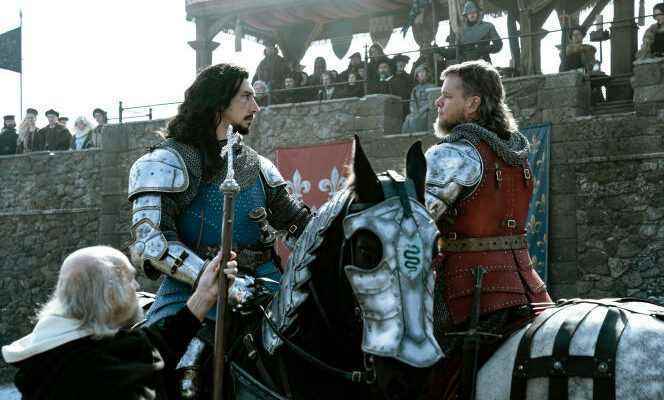CANAL+ CINEMA – TUESDAY JULY 26 AT 10.30 P.M. – FILM
When Ridley Scott is interested in the question of the consent to a sexual relationship, at the time of the knights, it gives a hybrid work, sincere but clumsy. The Last Duel is inspired by a true story: the battle fought in Paris on December 29, 1386, during the Hundred Years’ War, between two knights, Jean de Carrouges and Jacques Le Gris, the latter being accused of having raped Marguerite, John’s wife.
A duel that says a lot about the invisibility of women at that time. If the husband wins the fight, his victory will be interpreted as a sign from God, confirming the thesis of the young wife – Marguerite’s word not being taken into consideration by the authorities. If the husband loses and dies, Marguerite will be accused of perjury: she will not survive Jean and will be burned alive at the stake.
In other words, the husband provokes a duel to save his reputation, thus putting his wife’s life at risk. Preserving the suspense until the last minute, The Last Duel immerses the spectator in the roots of the ancestral inequality between women and men, and of the “culture of rape”.
A little school
Starting with its share of fights, breastplates and betrayals, the film gradually focuses on the couple formed by Jean de Carrouges (Matt Damon) and the blonde Marguerite (Jodie Comer): their most basic sexual relations, the disarray of the young wife who cannot “give an heir” to her husband…
One day when she finds herself alone at the castle, Jacques Le Gris (Adam Driver), scholar and libertine, favorite of Count Pierre d’Alençon (Ben Affleck), a depraved and peroxidized man, visits her and declares his love for her. Marguerite asks him to leave, Jacques refuses and pursues her up the stairs, which leads to his bedroom. He has no trouble slapping her on the bed and achieving his ends, persuaded to express his love to this woman who, however, keeps saying no. “Don’t say anything, my love, your husband would kill you”, he said to her as he left. But Marguerite is not silent, and her husband agrees to support her in her accusation of rape – not out of feminism or empathy, but to recover her “territory”.
The trial that opens leaves each party the opportunity to express its version. Each time, the film shows the same scene: did Marguerite try to close the door on Jacques, or not? Did she smile at him, did she find him attractive? So many elements that seem out of place for today’s viewer. As long as Marguerite refused the relationship, it doesn’t matter whether she did this or that.
By deconstructing the act in this way, the film shows, in a somewhat scholarly way, how a man, at that time, used and interpreted the cultural codes in force, to evaluate the female consent himself, without worrying about the agreement or not of the person concerned. A good feminist film in all respects.
The Last Duel, film by Ridley Scott (EU-UK, 2021, 152 min). With Jodie Comer, Matt Damon, Adam Driver, Ben Affleck. On MyCanal until August 20
